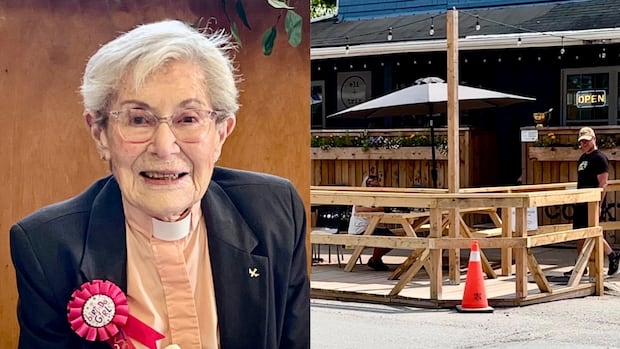‘All levels of community support are needed’: Coming together to address rural homelessness in Pictou County

NEW GLASGOW, N.S. — Rural homelessness isn’t known for being visible, but for residents in Pictou County it has caught their attention.
Since the COVID-19 pandemic, New Glasgow’s homeless shelter, Viola’s Place, has seen an uptick in people reaching out for support, whether it’s needing a bed to sleep in for the night or longer-term support finding housing.
Community members filled the small community room at the back of New Glasgow’s Public Library on Thursday night, Jan. 18, for a public consultation with Viola’s Place, New Glasgow’s police chief and volunteers about the state of homelessness in the community.
“It’s not a simple issue at all,” said Dwayne Wright, the chair of the board for Viola’s Place Society.
Increased need
According to Lisa Deyoung, the executive director of Viola’s Place, they have seen a marked increase in people accessing their services, particularly seniors. She said that prior to COVID-19, it would take them around 30 days to get someone housed, and now it takes between 10 to 12 months.
She also pointed out the shelter has seen an increase in more vulnerable clients, such as those struggling with health issues, addiction issues or inappropriate referrals from the hospital.
Over the past year, Deyoung added that homelessness in Pictou County has become more noticable. Typically, those homeless in rural areas are less visible, with many unhoused people tenting or couch surfing. Now, the issue has become more visible and has community members concerned.
“All levels of community support are needed,” said Deyoung.
Wright echoed Deyoung.
“No one wakes up one day and wants to be homeless,” he said. “It really does take a village to provide them with support.”
Following a slideshow presentation about Viola’s Place, the work they do, and the unique struggles the homeless population faces, community members were encouraged to ask questions.
Safe place for women and 2SLGBTQ+?
With 90 per cent of Viola’s Place’s clientele being male, the question of whether Viola’s Place is a safe space for women and members of the 2SLGBTQ+ population was one of the first addressed.
Wanda White, the co-chair of Pictou County Pride and the owner of the Odditorium, a business not far from Viola’s Place, said she’s become intimately familiar with some of the clients of Viola’s Place.
She said living close to Viola’s Place, she’s recently had an uptick in the number of women and 2SLGBTQ+ people coming to her door asking for help because clients of Viola’s Place have either assaulted them or don’t feel safe there.
“I just feel that if you can’t serve the most vulnerable, then who can you serve,” said White. “Somebody has to do something. Women have been assaulted by men at the shelter.”

Deyoung acknowledged that the shelter isn’t the best environment for women, especially women who have a history of abuse. However, she did highlight that Viola’s Place works closely with the Tearmann Society to ensure women fleeing domestic violence can access proper support.
As for the violence that has occurred at Viola’s Place, Deyoung said they have a zero-tolerance policy and will ban people long-term for violence, sexual assault, or unnecessary aggression on other clients or staff.
“We don’t assume responsibility for what people do on the street, however,” she added. “We do know that the shelter is not the most comfortable space for non-male clients.”
While the question specific to unhoused members of the 2SLGBTQ+ community weren’t directly answered at the meeting, Wright extended an invitation to White to collaborate and discuss possibilities to create a safer space for women and members of the 2SLGBTQ+ community at the shelter.
However, suggestions of having a space dedicated to non-male clients at Viola’s Place aren’t feasible due to logistics and the space constraints of the building.
Not just a New Glasgow problem
Robert Parker, the Municipality of Pictou County (MOPC) warden, was also in attendance at the meeting, not as the county warden, but as a board member for Viola’s Place. He challenged the idea that homelessness in Pictou County is only relegated to New Glasgow and doesn’t touch the more rural communities in the county.
“There are no homeless people in Lismore or River John. But that’s not true, is it?” said Parker. “They all come to New Glasgow because this is where the resources are. So, we can’t say as a county that we don’t have any (homeless people), and then New Glasgow is left with trying to deal with any problems that go on.”
He added that everyone has to come together to combat homelessness.
“We have to work together to find solutions. This isn’t what I would call a love-in,” he continued.
New Glasgow’s police chief, Stephen Chisholm, provided some data on the homelessness situation in the county. As of August 2023, he said of the 230 people in Pictou County accessing support through the Person Directed Planning program offered by the Department of Community Services, 57.7 per cent are precariously housed, 49.6 per cent experience food insecurity and 36.6 per cent are unhoused.
He added that since the beginning of the COVID-19 pandemic, there has been a large increase in wellness and addiction calls.
“There’s a huge gap in what’s available, and those numbers are important,” Chisholm said. Wright added that the statistics provided show roughly 80 people would be considered unhoused. Viola’s Place only has space for 20 people a night.
Terri Cameron, a community mental health nurse at the Aberdeen Hospital and a volunteer with Viola’s Place, added that the statistics only represent community members who are accessing services.
“There is a core population of people who will never touch services,” Cameron said, adding that the numbers are most likely higher.
‘It’s bigger than all of us’
Angela Bowden, a resident of New Glasgow and author and activist, was also in attendance. She said since this summer, she’s seen an increase in unhoused people in the community, and at first, was alarmed but then wondered how to combat homelessness and support these people.
“I had a conversation with a police officer once about some of the crime that seemed to be happening, and he said that people aren’t attached to the community anymore,” she said. “My comment to him was, ‘How do we connect to them?’ I’ve worked with incarcerated women, and one of the first things we were taught was building relationships and keeping safe. Proximity keeps everybody safe.”
As a result, the entire community needs to come together to develop a solution, she added.
“I know that we all need to be part of the solution because it affects all of us. Homelessness is all of our problems.”
Brian Bowden (no relation), the founder of Viola’s Place Society, echoed Angela’s sentiments that the homelessness crisis is bigger than Viola’s Place and that the shelter, designed to help, can’t fight homelessness alone.
“It’s bigger than all of us,” Brian said. “Viola’s Place can only do so much. This is so much bigger than Viola’s Place.”





